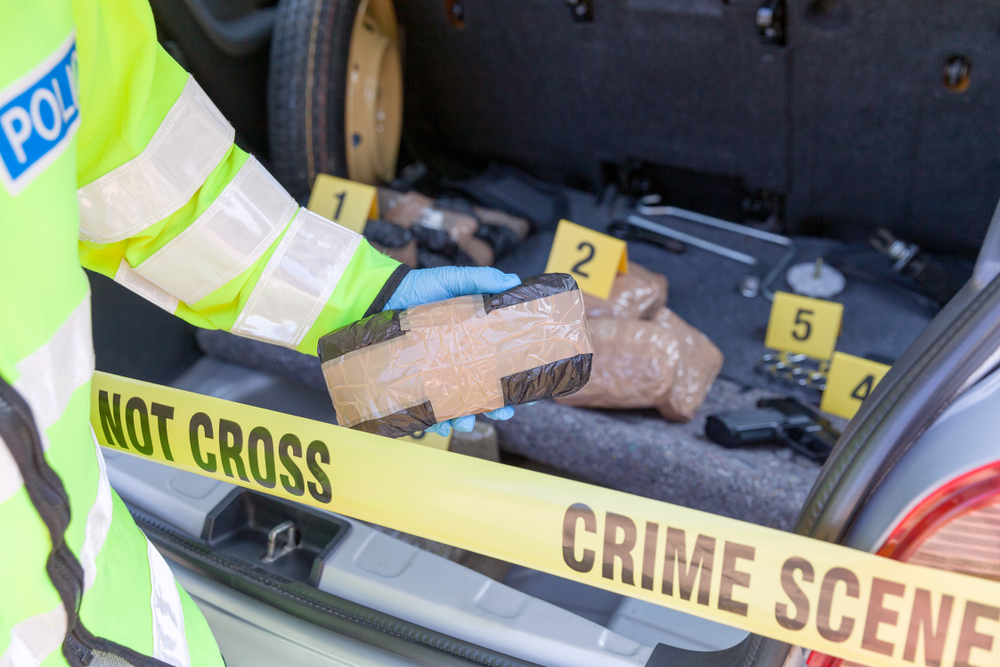Share This Article
ArrayThe Case of DPP v Leonard [2001[ NSWSC
A man from Dubbo NSW, Mr. Leonard was charged with supplying prohibited drug charges and 3 further charges of drug possession offences. The drug supply charges were on the basis that it was over the ‘traffickable’ quantity of cannabis.
The matter proceeded to the Local Court for a defended hearing on a plea of not guilty to all charges.
The basis of pleading not guilty was a legal argument that the drugs found were found as a result of the police officer acting unlawfully because the search was illegal.
Under the law, if the search is found to be illegal, then any evidence obtained as a result such as drugs or admissions can be ‘kicked out of court’ and un-usable by the police to prove the charges. If this happens, then the charges will be dismissed with a finding of not guilty by the Court.
The Facts
At approximately 12:30am on 28 April 2000 police officer Constable Barnes was performing duties of conducting random breath tests (RBT) upon motorists travelling on Sturt Highway.
At around this time Troy Claude Leonard was driving his vehicle with a female passenger seated in the front passenger seat on the Sturt highway.
Constable Barnes signalled to Mr. Leonard’s vehicle to stop for an RBT.
Mr. Leonard stopped his car next to Constable Barnes when the following conversation took place between Constable Barnes and Mr. Leonard:
Constable Barnes: “good evening sir, you have been stopped for a random breath test. Have you consumed any alcohol this evening?”
Mr. Leonard: “No, not at all.”
Constable Barnes: “Sit, om accordance with the Provisions of the Road Transport (Safety and Traffic Management) Act of 1999, I require you to undergo a breath test for the purpose of indicating the concentration of alcohol present in you (sic) blood and I direct you to exhale deeply in one single breath, air from your lungs directly into this approved device until I tell you to stop.”
Mr. Leonard supplied a sufficient sample of air into the device.
Constable Barnes: “Sir, the test has proved negative, may I see your licence please?”
Mr. Leonard: “Sure, no worries.”
Mr. Leonard showed the officer his NSW driver licence.
Constable Barnes: “Sir can I ask the purpose of your journey this morning?”
Mr. Leonard: “We have come from Adelaide and we’re going home to Dubbo.”
Constable Barnes: “Are you on holidays or something?”
Mr. Leonard: “No, not really.”
Constable Barnes: “is this your vehicle?”
Mr. Leonard: “No, it’s a hire vehicle.”
Constable Barnes: “Sir, would you consent to a search of your vehicle?”
Mr. Leonard: “Why?”
Constable Barnes: “Sir, we have a lot of illegal substances that are being transported along the Sturt Highway, particularly in hire vehicles such as these. What I would like to do is conduct a search of the vehicle in your presence to check for any such substances or illegal drugs.”
Mr. Leonard: “Go for it, there is nothing in here mate.”
Constable Barnes: “We will start in the rear of the vehicle in the boot.”
Mr. Leonard: “Fine.”
Police then found bags of cannabis which was concealed within a luggage located inside the boot of the vehicle that Mr. Leonard was driving. The luggage was identified by Mr. Leonard as belonging to him.
Mr. Leonard was immediately arrested and taken to the Hay police station where police found further bags of cannabis in the luggage.
While at the police station Mr. Leonard agreed to earlier consenting to the search of his vehicle by police while stopped at the Sturt Highway. This was reflected in writing in a notebook which Mr. Leonard read and signed.
However, when asked whether he wished to participate in a recorded interview, Mr. Leonard declined.
When Can Police Search Your Car Without a Warrant?
A police officer is allowed to search your motor vehicle if:
- There is a search warrant. A search warrant takes time to obtain and is not always practical; or;
- With consent of the person accused; or
- If there is no search warrant, the vehicle can only be searched if the police officer has ‘reasonable grounds’ for suspecting any one of the following:
- The vehicle has prohibited drugs or someone in the vehicle has prohibited drugs;
- The vehicle or person in it has something stolen or unlawfully obtained;
- The vehicle is being used in connection with an offence;
- The vehicle has anything inside it which is connected with an offence;
- The vehicle has a dangerous article inside it which is to be used in connection with an offence in circumstances the vehicle is in a public place or school;
- There are circumstances (or the vicinity) in which the vehicle is in a pubic place or school that give rise to a serious risk of public safety, and exercising the power to search the vehicle may reduce that risk.
This is reflected in section 36 of the Law Enforcement (Powers and Responsibilities) Act 2002 (NSW).
If any one of the above legal ways for police to search a vehicle don’t apply, then the police search will be considered illegal. If the search is considered illegal, then the Court will decide whether or not to exclude the evidence obtained after the illegal search under section 138 of the Evidence Act 1995 (NSW).
The Magistrate or Judge can exclude any evidence obtained after the illegal search, under s138 of the Evidence Act, if the desirability of allowing the evidence is outweighed by the undesirability of letting the evidence in.
In determining whether the desirability is outweighed by the undesirability of admitting the evidence after it was illegally obtained by police, the Judge or Magistrate will look into the gravity of how serious the illegality by police was, how serious the breach of the civil rights of liberty were, any breach of the International Covenant on Civil & Political Rights.
The Defence argument in Mr. Leonard’s case included the following submissions:
- No Reasonable Suspicion to Search: The police officer did not form a reasonable basis for a suspicion referred to in section 36 of the Law Enforcement (Powers & Responsibilities) Act 2002 (NSW).
- No Proper Consent Was Given: if there was no reasonable grounds for suspicion for police to search the vehicle, then even if the consent by Mr. Leonard was given for police to conduct the search of his vehicle, that consent could not constitute proper consent under the law because Mr. Leonard’s consent was not an informed consent (in other words, that he was not aware or nor was he informed that that he had a right to refuse consent for police to search the vehicle).
The Court held that in respect to the reasonableness of suspicion argument, the police officer’s knowledge that the Sturt Highway is often used for moving prohibited drugs in hire vehicles cannot by itself amount to a reasonable basis for police to form a suspicion that Mr. Leonard’s hired vehicle had prohibited drugs inside it.
As to the argument of there being no proper or valid consent for police to search the hire vehicle, the court said that because there was no pressure, coercion, trick or bullying used in getting the consent, the consent by Mr. Leonard was voluntary and valid consent.
As a result, the evidence of the drugs found from searching the hire car is admissible evidence which can be used in court against Mr. Leonard.
Can Police Search Your Car with Your Consent If You Didn’t Know Your Right to Refuse Consent?
Unless there is evidence of a person being coerced, tricked or bullied into consenting, a voluntary consent in the absence of having knowledge of a right to refuse the consent for police to search your vehicle will still be considered as valid and voluntary consent under the law.
However, the absence of knowing that you have a right to refuse a consent for police to search your vehicle can still amount to there being an invalid or involuntary consent if the absence of knowledge of a right to refuse consent in the circumstances suggests that your will has been overborne (or consent was involuntary) by for example coercion or tricks or bullying.
A police officer is not required to inform you of your right to refuse consent to searching your vehicle in these circumstances.
Any questions arising from this blog? Our experienced team appear in all court and are available 24/7 for advice.
We have experienced criminal defence lawyers in Newcastle, Bankstown, Parramatta and Penrith.
Book a Lawyer Online
Make a booking to arrange a free consult today.
Call For Free Consultation
Call Now to Speak To a Criminal Defence Lawyer
Over 40 Years Combined Experience
Proven SuccessAustralia-Wide
Experienced LawyerGuarantee
 (02) 8606 2218
(02) 8606 2218
 (02) 8606 2218
(02) 8606 2218















